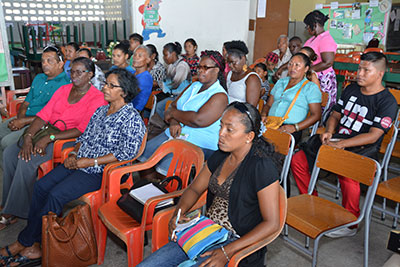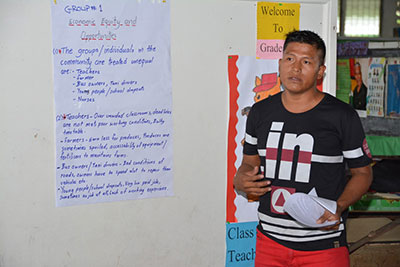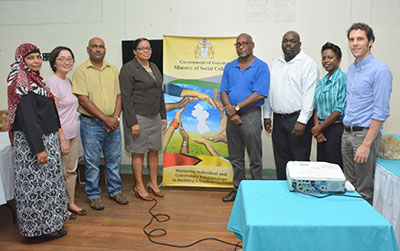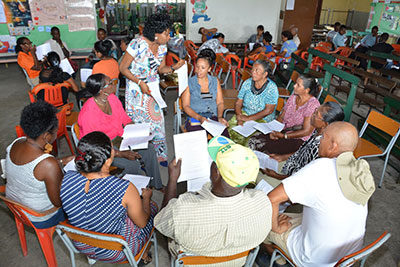Social Cohesion fosters a healthy, well-functioning society which is an important aspect for

sustainable development. It therefore becomes incumbent on Governments to ensure that the right policies and programmes are in place to achieve this goal.
The task allotted to the Ministry of Social Cohesion is a great one: to ensure that individual and community relationships are nurtured to have a unified Guyana. Unifying Guyana, of course, goes beyond differences of race and ethnicity and includes every aspect of our social lives, religion, age, geographic location – and all other similar factors that divide us. Social Cohesion therefore means bridging those gaps, to promote the development of a country, where all diversities are embraced, conflicts are resolved, where equity is promoted and all decision-making processes lead to equal opportunities and benefits for all of Guyana.

Over the past few months, the Ministry’s main focus has been the compilation of a 2017-2021 Strategic Plan on Social Cohesion in Guyana, which will be completed by the end of 2016. One of the core aims of the Strategic Plan is to have the input of the people so as to adequately address specific issues affecting social cohesion across the country.
Minister of Social Cohesion, Ms. Amna Ally said that this past June, the Ministry began a countrywide initiative to host 32 consultations throughout the 10 Administrative Regions, to meet with key stakeholders from various communities to address issues hindering social cohesion among various groups. The Minister said that the

Consultations have included a wide cross section of stakeholders from non-governmental organisations, special groups, political groups, regional democratic organisations and other groups and have been well attended.
Minister Ally noted that the work of the Ministry has been tremendously supported by the United Nations Development Programme (UNDP), which has allowed the Ministry to reach a large number of persons through financing and other support. “The Government’s mandate is that everyone must enjoy the same benefits without division. So very soon in the future you will see efforts to scale up activities in order to achieve this goal,” she said.
So far, 22 Consultations have been hosted and the Ministry has reported that the response from stakeholders has been overwhelming. Project Coordinator of the Ministry of Social

Cohesion, Ms. Sharon Patterson has said that the positive response, thus far, has stemmed from the realisation that the consultations allow them to play a role in the decision-making process. “It is validating. It gives a sense of inclusion, and people get to exercise their trust in the Ministry in that we are working and talking with them and they are open and indicating their beliefs of what is important. They are identifying key issues and how they believe they could be addressed in responding to the issue of social cohesion and what they see as bringing Guyana together to unify a nation,” she said. Ms Patterson added that the consultations to date have also provided insight into immediate steps that must be taken to help the process along.
Resident Representative of the UNDP to Guyana, Ms. Mikiko Tanaka said that the organisation is pleased to support the Ministry’s work, as social cohesion serves as a core foundation for peace and development.
“In the context of Guyana, I am very happy to hear that this is a very important issue and objective for the country. This motto Guyana has of ‘One People, One Nation, One Destiny’ very much captures that aspiration that Guyana has, so the UNDP has been accompanying the process of developing a national strategy for social cohesion under this current administration and led by the Ministry of Social Cohesion,” she said.
Ms. Tanaka said that most importantly, it is the voice of the local people that make up the issues and challenges of social cohesion and what they would like to do to achieve social cohesion. From these consultations, she expressed the hope that there is a better sense of the strategic complimentary actions that are needed to bring the society together.
Lead Consultant for the Social Cohesion National Strategic Plan, Dr. Thomas Gittens, who facilitates the Consultations, said that this initiative has highlighted proposals and responses that reflect the particular issues that are affecting the communities. “We have had a tremendous level of participation and input at all the consultations. In many cases we have received very good content, because people have been speaking their minds,” he said.
Residents conducted group discussions to come up with recommendations among five thematic focus areas identified by the Ministry. The first is economic equity and opportunities which aim to ensure that persons belonging to different racial groups, unemployed youth, low wage workers in specific sectors, small business owners and other groups feel less economically unequal to others they see as more fortunate. Citizens’ safety and security is the second group which aims to ensure that persons feel safer and that there is less tension and less personal, ethnic, racial and criminal insecurity among all groups of persons.
The focus on social inclusion and tolerance involves ensuring that persons with disabilities, members of the Lesbian, Gay, Bisexual or Transgender (LGBT) community and other minority and excluded groups feel socially equal and that discrimination and exclusion is reduced. Inclusive and participatory governance will seek to ensure that persons have a better understanding of the Constitution, the system of government and institutions at national, regional and community levels are more involved and have more confidence in the decisions taken that affect individuals and communities. The final focus area is harmonious ethnic and racial relations. This group seeks to ensure that there is a clear improvement in relations and interactions among the ethnic and racial groups. Once the Strategic Plan, which will comprise stakeholders’ input, is in place, these aims are all expected to be achieved by the year 2021.
With the Consultations ongoing, the Ministry launched its Diversity Education and Inclusion Workshop in October as one of the strategies that will be run concurrently to develop social cohesion within communities. The initiative involves the training of a core team of trainers, who will work in the Ten Administrative Regions to train over 700 citizens to become social cohesion advocates within their communities. In addition to building capacity, the training will also allow community members to have an interface with the Ministry and stay abreast with the progress of the Ministry’s social cohesion mandate.




.png)









